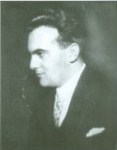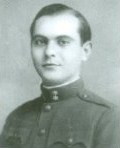The BALASSA family (original surname GEIGNER)
was a distinguished family in
Hódmezővásárhely. The patriarch, József, was a
wood and coal wholesale merchant, who had two sons, Dr. Ferenc BALASSA,
a dentist, and György BALASSA, a
milliner. In 1942, József
and Ferenc were serving on the Aid
Committee, and Ferenc was
President of the School Board as well as
served as President of the Committee for
Housing the Homeless. József also served
on the Jewish Council.
Ferenc was conscripted into a Labor Battalion and sent to serve on the Russian front along the Don River, where he was wounded. In 1943, he was transferred to Beregszasz and worked in a hospital as a surgeon. On 23 May 1944, he was deported to Auschwitz, where he arrived on 26 May 1944. The same day he was sent to Krakau-Plaszow to work as a doctor and aid in the sterilization of the barracks. The last sighting of him alive was on 3 Aug 1944. He was pronounced dead on 15 Sep 1945.
György was conscripted into Labor Service in late June 1944. Previously he had been a private in the Army. He was later deported with the rest of his family to the camps around Vienna where he contracted typhus and died in Wels, Austria in 1945.
In mid-June, along with the rest of the Jews of Hódmezővásárhely, the BALASSA family was deported to Szeged and interred in the brick factory awaiting transfer to Auschwitz. In his role as a member of the Jewish Council, József BALASSA apparently was able to arrange for some of his family to be part of the group diverted to Austria as part of Rezső KASTNER's negotiations with Adolf EICHMAN. They were sent to a camp near Vienna and put to work in nearby towns clearing debris resulting from Allied bombings. Toward the end of the war as the Russians approached, the SS prepared their retreat and began organizing a forced march of the laborers to the Mauthausen extermination camp. Though contact between Austrian civilians and the Jewish laborers was forbidden, Ferenc's son had established a relationship with the WINTER family. Miraculously, the BALASSA family escaped from the forced march and were rescued by the WINTER family, who hid a total of 6 people, including Ilona BALASSA (Ferenc's wife) and her teenage son, Ilona's sister in law Magdolna BALASSA (Györy's wife) and her newborn son, and Magdolna's parents, in their cellar until a few weeks after the arrival of the Soviets. The BALASSA family then returned to Hódmezővásárhely on foot.
Ferenc's wife and son visited the WINTER family in 1946 and told them they were en route to Romania to stay with relatives there. That was the last contact the two families had, until early in 2014, when Inge WINTER, who was only a child of 9 years old during the period the BALASSA family hid in her cellar, discovered the BALASSA family name on this web site. Based on an old address, she managed to locate the son, now in Australia.
Inge decided to write the story of how her family rescued the BALASSA's, so that "the next generation will know what happened." She feels it is the duty of every person to help in such a situation as far as it is possible, without seeking praise or thanks afterwards, despite the danger this would have posed to her family if the SS had discovered them.
The story of Inge's family, in German and in pdf form, has been published on the web. You can read it at http://www.erlebtezeitgeschichte.net
Here is a partial genealogy of the Balassa family:
1) Fülöp GEIGNER married Johanna KVITTNER
2) József BALASSA (1879-?) married Ilona WEISZ (1885-?)
3) Ferenc BALASSA (1902 - 1944?) married Dr. Livia BANETH (1902-?), daughter of Dr. Samu BANETH and Aranka DÓZSA.
4) son; lives in Australia.
3) György BALASSA (1908-24 May 1945, Wels, Austria), milliner, married Magdolna SZEMZÖ (1916-?), daughter of Dr. Miksa SZEMZÖ and Margit PARTOS. Magdolna, though pregnant and hospitalized, was nevertheless taken from the hospital to be deported to Szeged, and then to Austria.
4) son; born in the brick factory in Szeged during the deportations, survived the camps near Vienna and today lives in Hódmezővásárhely with his family.
Return to Hódmezővásárhely home page
Ferenc was conscripted into a Labor Battalion and sent to serve on the Russian front along the Don River, where he was wounded. In 1943, he was transferred to Beregszasz and worked in a hospital as a surgeon. On 23 May 1944, he was deported to Auschwitz, where he arrived on 26 May 1944. The same day he was sent to Krakau-Plaszow to work as a doctor and aid in the sterilization of the barracks. The last sighting of him alive was on 3 Aug 1944. He was pronounced dead on 15 Sep 1945.
György was conscripted into Labor Service in late June 1944. Previously he had been a private in the Army. He was later deported with the rest of his family to the camps around Vienna where he contracted typhus and died in Wels, Austria in 1945.
In mid-June, along with the rest of the Jews of Hódmezővásárhely, the BALASSA family was deported to Szeged and interred in the brick factory awaiting transfer to Auschwitz. In his role as a member of the Jewish Council, József BALASSA apparently was able to arrange for some of his family to be part of the group diverted to Austria as part of Rezső KASTNER's negotiations with Adolf EICHMAN. They were sent to a camp near Vienna and put to work in nearby towns clearing debris resulting from Allied bombings. Toward the end of the war as the Russians approached, the SS prepared their retreat and began organizing a forced march of the laborers to the Mauthausen extermination camp. Though contact between Austrian civilians and the Jewish laborers was forbidden, Ferenc's son had established a relationship with the WINTER family. Miraculously, the BALASSA family escaped from the forced march and were rescued by the WINTER family, who hid a total of 6 people, including Ilona BALASSA (Ferenc's wife) and her teenage son, Ilona's sister in law Magdolna BALASSA (Györy's wife) and her newborn son, and Magdolna's parents, in their cellar until a few weeks after the arrival of the Soviets. The BALASSA family then returned to Hódmezővásárhely on foot.
Ferenc's wife and son visited the WINTER family in 1946 and told them they were en route to Romania to stay with relatives there. That was the last contact the two families had, until early in 2014, when Inge WINTER, who was only a child of 9 years old during the period the BALASSA family hid in her cellar, discovered the BALASSA family name on this web site. Based on an old address, she managed to locate the son, now in Australia.
Inge decided to write the story of how her family rescued the BALASSA's, so that "the next generation will know what happened." She feels it is the duty of every person to help in such a situation as far as it is possible, without seeking praise or thanks afterwards, despite the danger this would have posed to her family if the SS had discovered them.
The story of Inge's family, in German and in pdf form, has been published on the web. You can read it at http://www.erlebtezeitgeschichte.net
Here is a partial genealogy of the Balassa family:
1) Fülöp GEIGNER married Johanna KVITTNER
2) József BALASSA (1879-?) married Ilona WEISZ (1885-?)
3) Ferenc BALASSA (1902 - 1944?) married Dr. Livia BANETH (1902-?), daughter of Dr. Samu BANETH and Aranka DÓZSA.
4) son; lives in Australia.
3) György BALASSA (1908-24 May 1945, Wels, Austria), milliner, married Magdolna SZEMZÖ (1916-?), daughter of Dr. Miksa SZEMZÖ and Margit PARTOS. Magdolna, though pregnant and hospitalized, was nevertheless taken from the hospital to be deported to Szeged, and then to Austria.
4) son; born in the brick factory in Szeged during the deportations, survived the camps near Vienna and today lives in Hódmezővásárhely with his family.
 |
 |
| Ferenc BALASSA |
György BALASSA |
Return to Hódmezővásárhely home page
copyright © 2014 by Judy Petersen

